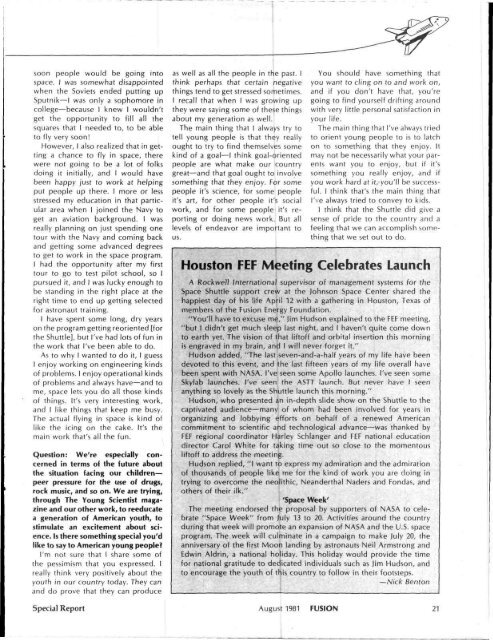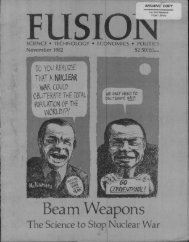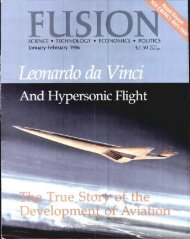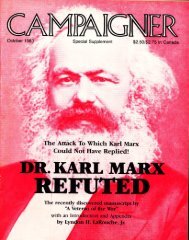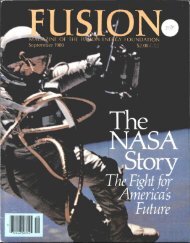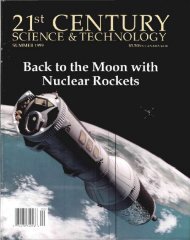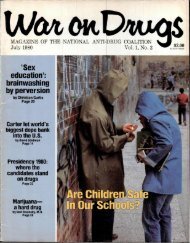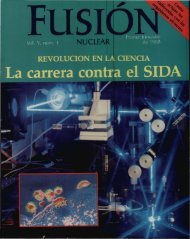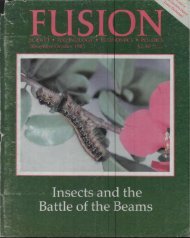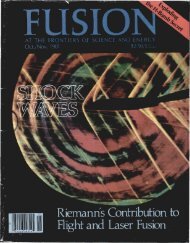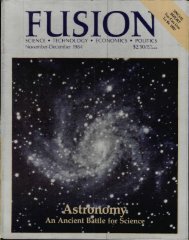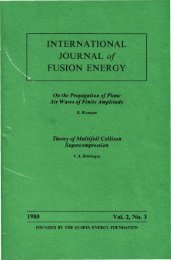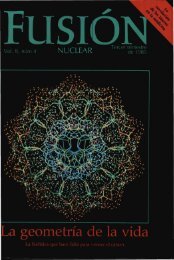Exclusive Interview with Shuttle Pilot Robert Crippen
Exclusive Interview with Shuttle Pilot Robert Crippen
Exclusive Interview with Shuttle Pilot Robert Crippen
You also want an ePaper? Increase the reach of your titles
YUMPU automatically turns print PDFs into web optimized ePapers that Google loves.
soon people would be going intospace. I was somewhat disappointedwhen the Soviets ended putting upSputnik—I was only a sophomore incollege—because I knew I wouldn'tget the opportunity to fill all thesquares that I needed to, to be ableto fly very soon!However, I also realized that in gettinga chance to fly in space, therewere not going to be a lot of folksdoing it initially, and I would havebeen happy just to work at helpingput people up there. I more or lessstressed my education in that particulararea when I joined the Navy toget an aviation background. I wasreally planning on just spending onetour <strong>with</strong> the Navy and coming backand getting some advanced degreesto get to work in the space program.I had the opportunity after my firsttour to go to test pilot school, so Ipursued it, and I was lucky enough tobe standing in the right place at theright time to end up getting selectedfor astronaut training.I have spent some long, dry yearson the program getting reoriented [forthe <strong>Shuttle</strong>], but I've had lots of fun inthe work that I've been able to do.As to why I wanted to do it, I guessI enjoy working on engineering kindsof problems. I enjoy operational kindsof problems and always have—and tome, space lets you do all those kindsof things. It's very interesting work,and I like things that keep me busy.The actual flying in space is kind oflike the icing on the cake. It's themain work that's all the fun.Question: We're especially concernedin terms of the future aboutthe situation facing our children—peer pressure for the use of drugs,rock music, and so on. We are trying,through The Young Scientist magazineand our other work, to reeducatea generation of American youth, tostimulate an excitement about science.Is there something special you'dlike to say to American young people?I'm not sure that I share some ofthe pessimism that you expressed. Ireally think very positively about theyouth in our country today. They canand do prove that they can produceas well as all the people in the past. Ithink perhaps that certain negativethings tend to get stressed sometimes.I recall that when I was growing upthey were saying some of these thingsabout my generation as well.The main thing that I always try totell young people is that they reallyought to try to find themselves somekind of a goal—I think goal-orientedpeople are what make our countrygreat—and that goal ought to involvesomething that they enjoy. For somepeople it's science, for some peopleit's art, for other people it's socialwork, and for some people it's reportingor doing news work. But alllevels of endeavor are important tous.You should have something thatyou want to cling on to and work on,and if you don't have that, you'regoing to find yourself drifting around<strong>with</strong> very little personal satisfaction inyour life.The main thing that I've always triedto orient young people to is to latchon to something that they enjoy. Itmay not be necessarily what your parentswant you to enjoy, but if it'ssomething you really enjoy, and ifyou work hard at it, you'll be successful.I think that's the main thing thatI've always tried to convey to kids.I think that the <strong>Shuttle</strong> did give asense of pride to the country and afeeling that we can accomplish somethingthat we set out to do.Houston FEF Meeting Celebrates LaunchA Rockwell International supervisor of management systems for theSpace <strong>Shuttle</strong> support crew at the Johnson Space Center shared thehappiest day of his life April 12 <strong>with</strong> a gathering in Houston, Texas ofmembers of the Fusion Energy Foundation."You'll have to excuse me," Jim Hudson explained to the FEF meeting,"but I didn't get much sleep last night, and I haven't quite come downto earth yet. The vision of that liftoff and orbital insertion this morningis engraved in my brain, and I will never forget it."Hudson added, "The last seven-and-a-half years of my life have beendevoted to this event, and the last fifteen years of my life overall havebeen spent <strong>with</strong> NASA. I've seen some Apollo launches. I've seen someSkylab launches. I've seen the ASTT launch. But never have I seenanything so lovely as the <strong>Shuttle</strong> launch this morning."Hudson, who presented an in-depth slide show on the <strong>Shuttle</strong> to thecaptivated audience—many of whom had been involved for years inorganizing and lobbying efforts on behalf of a renewed Americancommitment to scientific and technological advance—was thanked byFEF regional coordinator Harley Schlanger and FEF national educationdirector Carol White for taking time out so close to the momentousliftoff to address the meeting.Hudson replied, "I want to express my admiration and the admirationof thousands of people like me for the kind of work you are doing intrying to overcome the neolithic, Neanderthal Naders and Fondas, andothers of their ilk."'Space Week'The meeting endorsed the proposal by supporters of NASA to celebrate"Space Week" from July 13 to 20. Activities around the countryduring that week will promote an expansion of NASA and the U.S. spaceprogram. The week will culminate in a campaign to make July 20, theanniversary of the first Moon landing by astronauts Neil Armstrong andEdwin Aldrin, a national holiday. This holiday would provide the timefor national gratitude to dedicated individuals such as Jim Hudson, andto encourage the youth of this country to follow in their footsteps.—Nick BentonSpecial ReportAugust 1981FUSION 21


